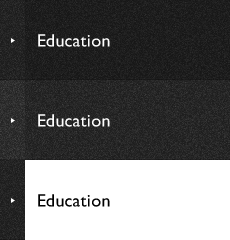Broader, deeper — a curriculum that supports those aiming to be globally successful researchers
Under the Mathematics Graduate Major, a wide variety of courses are available, allowing students to study more advanced mathematical theories according to their interests. In addition to normal courses, intensive courses (known as Special Lectures) are also offered, allowing students to learn about topics that are currently the subject of intense research. In Research Seminars and Special Mathematics Research, students study, under the guidance of academic supervisors, specialized content necessary for composing their master's thesis, thereby taking their first step into research activities.
-
-
Entrance
Examination
-
- Applicants must pass an entrance examination to advance from an undergraduate major to a master's program.
-
Master's Program
(2 Years)*1
- 400-Level and 500-Level Courses
-
By proactively learning mathematical theories, logical thinking and critical observation skills are trained; and by thinking about a variety of mathematical problems, analytical skills and problem-solving skills are developed. Building on the fundamental knowledge gained in the Bachelor's Program, more advanced mathematics is learned. Lectures are broadly divided into Advanced Lectures and Special Lectures in algebra, geometry, and analysis. In the Advanced Lectures, students learn content that is generally considered a requirement, and in the Special Lectures, cutting-edge content that is currently the subject of active research is explained. In Research Seminars and Special Mathematics Research, students acquire knowledge by reading highly advanced technical texts and academic papers, and use that knowledge to tackle particular research questions. As a result, students learn how to progress in mathematical research, and acquire the skills necessary to write academic papers.
-
- Algebra
- Building on the fundamentals learned in the Bachelor's Program, more specialized content in modern algebra is studied.
Keywords: representation theory, algebraic geometry, arithmetic geometry, number theory, analytic number theory, automorphic form theory
-
- Analysis
- Applying what was learned in the Bachelor's Program about analysis, more specialized, specific topics are studied.
Keywords: partial differential equations, global calculus of variations, nonlinear analysis, complex analysis, probabilistic analysis, dynamical systems theory
-
- Geometry
- With more involved topics, especially important theories of modern geometry are studied.
Keywords: fiber bundles, differential topology, knot theory, low-dimensional manifold theory, curved surfaces, Riemannian geometry, global geometry, Hodge theory, complex manifolds
*1 Indicates the standard model where the master's program is completed in two years.
-
Completion
-
- Advancement
Assessment
- Applicants must pass an advancement
assessment to advance from a master's program to a doctoral program.
Other Universities'
Graduates and Working Adults
-
- Entrance
Examination
- Applicants must pass an entrance
assessment to advance from another university to a doctoral program.
-
Doctoral Program
(3 Years)*2
- 600-Level Courses
-
Perform full-fledged research based on the understanding of cutting-edge mathematics learned in the Master's Program, and from research questions and results obtained during master's thesis research. Students will deepen their understanding of their specialized area, and compose an academic paper of a standard that could be submitted to journals. While conducting their research, students will attend Research Seminars and Special Mathematics Research, where they will report their progress, receive advice on mathematical content and how to proceed with their research, and learn the method for composing academic papers. The curriculum also allows students to look beyond their specialist domains with Cutting-Edge Mathematics Special Lectures that cover currently popular topics.
-
- Algebra
- Students study topics being actively researched at the frontier of algebra. Recently, the following topics have been dealt with:
Representation theory of affine Hecke algebra and quantum groups, algebraic and geometric structures related to Macdonald polynomials, discrete Painlevé equations, Anabelian geometry, and Witten zeta functions
-
- Analysis
- Students study topics at the cutting edge of modern researcher-level analysis. Recently, the following topics have been dealt with:
The explosion problem of nonlinear heat equations, introduction to random complex dynamics, conformal mapping of Riemann surfaces, introduction to geometric analysis, introduction to the large deviation principle, boundary value problems of elliptic equations, and the Oka-Cartan theory
-
- Geometry
- Students study topics currently being actively researched in geometry. Recently, the following topics have been dealt with:
Rigidity problem in Riemannian geometry, combinatorial group theory, Ricci flow, the Yamabe problem, real singular point theory, contact topology, and generalized Kähler structures
*2Indicates the standard model where the Doctoral Program is completed in three years.
-
Completion
-
. Any information published on this site will be valid in relation to Science Tokyo.


